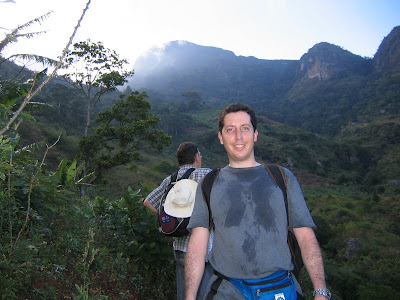
Don't let the expression on my face fool you, this picture was taken at the very beginning of my hike up Mount Lupanga. It would be quite an understatement to say I was not a very happy camper by the time we returned home.
Yesterday I hiked up to the top of Mount Lupanga. Lupanga is the tallest of the three mountains that make up the Uluguru mountains of Morogoro, and at its peak it is 2150 meters above sea level.
Our hike took twelve and half hours from start to finish. Seven hours to reach the peak and 5 1/2 hours to climb down the mountain. We made two stops on our way up. By the second stop, two people decided they would not make it to the top but I joined one other person and our tour guide and we did make it to the peak.
Had I known how difficult it would have been to reach the peak and back I would have never decided to do the hike. Approximately the last half of Lupanga involves a hike through the forest, up a very narrow dirt path that twists and turns through trees at a very steep incline. The last hour up the mountain was by far the most difficult as the incline was the steepest, almost 90 degrees, requiring using roots and trees to pull ourselves up. Our tour guide would say "pole pole" (very slowly) and "keep left"; when I saw the cliff falling off next to me, I knew why.
When we reached the peak I was completely exhausted, yet exhilerated and also a little disappointed because we were surrounded by trees with no view. At the peak is a tall ladder like structure which you can climb to get a view, but I didn't have enough energy to do so.
Getting back down the mountain was by far more challenging than reaching the top. A muddy trail, covered with wet leaves, roots and large rocks, falling straight down, made it incredibly challenging. So difficult that I did not hike down the mountain, rather I slid down most of the way.
In retrospect, I don't regret the hike, and I'm happy I made it to the top, but now I'm confident that I will not be climbing any more mountains in the near future, or quite possibly not again in this lifetime. And, if by chance you ever come to visit me in Tanzania, I would not recommend climbing Lupanga unless you are asking for a little bit of pain and a lot of agony!!
 The view of the front of St. Thomas Kilakala monastery, our hotel for the past 3 weeks.
The view of the front of St. Thomas Kilakala monastery, our hotel for the past 3 weeks.








































